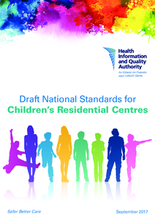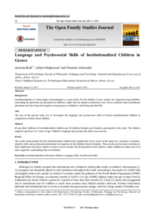Displaying 251 - 260 of 490
Ireland's Health Information and Standards Directorate has launched a public consultation on the Draft National Standards on Children's Residential Care. Once finalized, the Standards will provide a framework for the ongoing development of child-centred and effective services for children living in residential care centres. This document contains the preceding Draft Standards, eligible for feedback through 02 November 2017.
This report presents the findings from a secondary analysis of data from a comprehensive intervention in three baby homes in St. Petersburg, Russian Federation. The analysis examined whether caregiver-child interaction quality, number of caregiver transitions, and group size mediated the impact of intervention on children's attachment behaviors and physical growth.
This study investigated the language and psychosocial skills of pre-school aged Greek institutionalized children in comparison to Greek children of the same age raised in a family environment.
This paper provides evidence-based guidance on the use of family interventions involving children with a history of institutionalization prior to their placement in family-based care through foster care, adoption, or reunification with their families.
This chapter from Child Maltreatment in Residential Care provides an overview of institutional care in Latin America and the Carribean, describes current efforts toward deinsitutionalization and child care reform in the region, and discusses practical suggestions for further research and reform.
This report analyzes the relationship between poly-victimization and the internalizing and externalizing symptoms amongst 12-17 year old youth living in residential care centers in Spain.
This study investigated the correlation between the self-reported academic achievement of Romanian institutionalized children living in long-term residential care and numerous variables related to their experiences in institutional care.
This paper is the final chapter of Child Maltreatment in Residential Care, summarizing and analyzing the research presented on child maltreatment in institutions, its impact on children, and prevention and intervention strategies.
This study explored the experiences of maltreatment and outcomes of adult care-leavers in Australia who lived in out-of-home care as children.
This report summarizes the findings from various studies investigating child sexual abuse within institutional care throughout Austria, Germany, and Switzerland and offers suggestions for future research and intervention.


